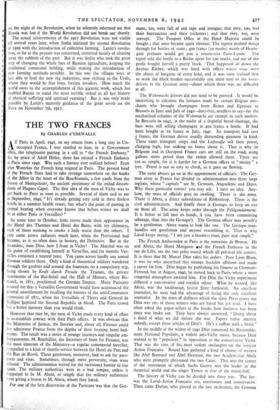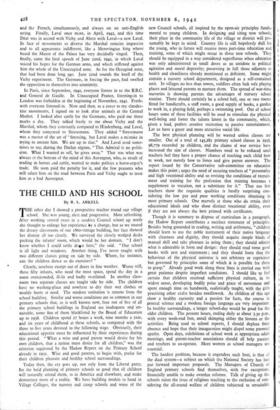THE TWO FRANCES
By CHARLES d'YDEWALLE
So some time in October, little stoves made their appearance in the Hotel des Thermes and Hotel des Bains, with toy chimneys, each of them seeming to smoke a little worse than the others. I 1 only came across radiators much later, when the Provisional had
become, as it so often does in history, the Definitive. But in the meantime, mon Dieu. how I froze in Vichy! The Marshal was on the point of establishing himself at Versagles, and for months Ver- sailles remained a neutral zone. You came across hardly any armed German soldiers there. Only a kind of theoretical soldiery wandered through the gardens and around the fountains on a compulsory trip, being shown by Kraft durch Freude the Trianon, the private apartments of the Roi-Soleil and the Hall of Mirrors, where Bis- marck, in 1871, proclaimed the German Empire. Many Parisians
assured me that a Versailles Government would have accentuated the general unsettlement by recalling the horrors of the anti-Communist tepression of 1871, when the Versaillais of Thiers and General de Gallipet baptised the Second Republic in blood. The Paris crowd has a better memory than you would think.
However that may be, the men of Vichy made every kind of effort to re-establish contact with their Paris offices. It was obvious that the Ministries of Justice, the Interior and, above all, Finance could not adminster- France from the depths of their freezing hotel bed- rooms. The result was a series of strange journeys and singular em- barrassments. M. Bouthillier, the Secretary of State for Finance, was the most itinerant of the Ministers—a regular commercial traveller, compelled to a kind of shuttle-service between the Hotel du Parc and the Rue de Rivoli. These gentlemen, moreover, had to ask for pass- ports and visas. Sometimes, through mere perversity, visas were refused. The administration waited for the sacrosanct barrier to rise again. The military authorities were in a bad temper, unless it happened to be M. Abetz, or simply that the military authorities were giving a lesson to M. Abetz, whom they hated.
For one of the first discoveries of the Parisians was that the Ger- mans, too, were full of red tape and intrigue; that they, too, had their bureaucrats and their tricksters ; and that they, too, were corrupt. The Passport Office at the Hotel Majestic could be bought ; that soon became quite obvious. The typists pushed things through for bottles of scent ; 400 francs (zo marks) worth of Houbi- gant perfume would get you a return-visa Paris-Lyons. The typist sold the bottle to a Berlin agent for too marks, and out of the profit bought herself a pretty frock. That happened all down the Avenue Kleber, which was lined with offices where visas were the object of bargains of every kind, and it was soon realised that to work the black market successfully you must turn to the lorry- drivers in the German army—about which there was no difficulty at all.
The Wehrmacht drivers did not need to be pressed. It would be interesting to calculate the fortunes made by certain Belgian mer- chants who brought champagne from Reims and Epernay to Brussels in June and July of two--duty-free, needless to say—for the mechanised columns of the Wehrmacht are exempt in such matters. In Brussels in 1942, n the midst of a frightful bread-shortage, the bars were still selling champagne at 400 francs a bottle. It had been bought at to francs in July, 1940. Its transport had cost 5 francs, the German driver usually demanding payment in kind. These same transport corps and the Luftwaffe sell their petrol, charging high, but making no bones about it. That is why in Belgium and in Occupied France cars are still on the road, using gallons more petrol than the ration allowed them. Tyres are not so simple, for it is harder for a German officer to " mislay " a tyre. Petrol is not so easy to check, so it goes on flowing.
The same abuses go on in the appointment of officials. The Ger- man army in France has divided its administration into three large regions, whose " capitals " are St. Germain, Angouleme and Dijon. Why these particular towns? you may ask. I have no idea. Any- how, the mass of officials goes on swelling. There is the army. There is Abetz, a direct subordinate of Ribbentrop. There is the civil administration. And finally there is Gestapo to keep an eye on them all. The army keeps order through the Feldgendarmerie. It is better to fall into its hands, if you have been committing sabotage, than into the Gestapo's. The German officer may possib:y be a gentleman. Abetz wants to look like one. The Gestapo man- handles any gentleman and anyone resembling it. That is why Laval keeps saying, "I am just a business man, pure and simple."
The French Ambassador at Paris is the notorious de ilrinon. He and Abetz, the Hotel Matignon airld the French Embassy in the rue de Lille, are the two poles round which all political life centres. It is there that M. Marcel Deat takes his orders. Poor Leon Blum, it was he who unearthed this strange Socialist offshoot and made a career for him. Dear began by publishing his Oeuvre at Clermont- Ferrand, but in August, 1940, he moved back to Paris, where a more congenial atmosphere awaited him. For Deat the Vichy experiment diffused a conservative and royalist odour. What he wanted, like Abetz, was the totalitarian, fascist State forthwith. An excellent journalist, he soon had the advantage of being the only excellent journalist. In the mass of dullness which the slave Press pours out Deat was one of those writers who are hated but yet read. I have often asked the paper-sellers at the kiosks how business has been since war broke out. They have always answered, "Doing about a third of what we did before the war. Papers today interest nobody, except those articles of Deat's. He's a ruffian with a brain."
In the middle of the winter of 1941 Dem conceived his Rassemble- ment National Populaire, a violent anti-Vichy move, because Deat wanted to be " populaire " in opposition to the conservative Vichy. That was the time of his most violent onslaughts on the royalist Action Francaise. Round him gathered a kind of chorus of writers like Abel Bonnard and Abel Hermant, the two Academician Abels who were promptly christened the two Cairn. This was the centre of the movement of which- Sacha Guitry was the leader in the theatrical world and the singer Trenet in that of the music-hall.
The history of Vichy can be divided into three eras. The firs • was the Laval-Action Fran caise era, reactionary and conservative. Then came Darlan, who played in the two orchestras, the German and the French, simultaneously, and always on an anti-English string. Finally, Laval once more, in April, 1942, and this time Dem was in accord with Vichy and Abetz with Laval—a new Laval. In face of movements so diverse the Marshal remains impassive and to all appearance indifferent, like a Merovingian king whose beard the Mayor of the Palace has very decidedly singed. Then, finally, came the fatal speech of June 22nd, 1942, in which Laval voiced his hopes for the German arms, and which stiffened against him the whole of the Unoccupied zone. As for the Occupied zone, that had been done long ago. June 22nd sounds the knell of the Vichy experiment. The Germans, in forcing the pace, had swelled the opposition to themselves into unanimity.
In Paris, since September, 1940, everyone listens in to the B.B.C. and General de Gaulle. In Unoccupied France, listening-in to London was forbidden at the beginning of November, 1941. Forth- with everyone listened-in. Now and then, as a cover to my clandes- tine movements, I signed on to look after animals at the Central Market. I looked after cattle for the Germans, who paid me three marks a day. They talked freely to me about Vichy and the Marshal, whom they constantly compared to Hindenburg, and Laval, whom they compared to Stresemann. They added " Stresemann was a master of the art of 'finessing, but Laval makes a mistake in trying to imitate him. We are up to that." And Laval used some- times to say, during the Darlan regime, "This Admiral is no politi- cian. What I wanted to sell, he gives away." That was what was always st the bottom of the mind of this Auvergnat, who, as result of trading in horses and cattle, wanted to make politics a horse-coper's trade. He soon paid the penalty for it, and the few peasants who still salute him on the road between Paris and Vichy ought to treat him as a bad Auvergnat.



























 Previous page
Previous page